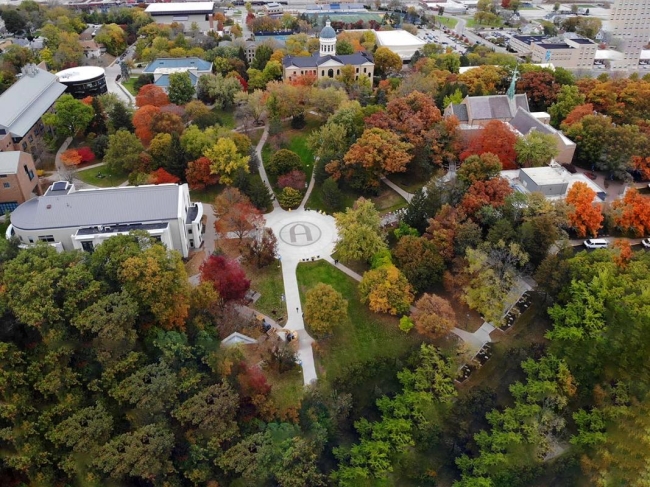You have /5 articles left.
Sign up for a free account or log in.

Augustana College
Why do students transfer colleges? They may have completed a degree at a community college, or they may be seeking a better education at a new institution. For many students, one way to measure whether the new college would be a good fit is to look at what happens to students when they graduate. Will they earn a decent salary?
Augustana College, in Illinois, is testing a possible way to reassure some potential transfer students by offering them an income guarantee.
It will offer them "income insurance," which will make up the difference -- for five years -- between the graduate's salary and the expected salary for someone with their major.
Augustana is the first client of a company called Degree Insurance, and the product is called American Dream Insurance. Degree Insurance isn't charging Augustana or the students who enroll. Normally, a college would pay $1,000 to $4,000 per student for the service.
The pilot is being offered to the first 20 transfer students who apply and are admitted between July 15 and Aug. 23.
Each student will be assured of the income guarantee -- with a few caveats.
- Each year after graduation, the student must share federal tax returns with the company.
- After five years, the company will pay any difference between the student's expected income (by major) and actual income. If a student's major was anticipated to deliver a $60,000 job but the graduate only earned $55,000 a year, the income insurance makes up the difference in a cumulative lump sum of $25,000 at the end of five years.
- Students must work in the United States.
- If the graduate decides to enroll in graduate school, serve a church mission or participate in Teach for America or a similar program, the coverage will be paused during those years. Once the graduate accepts their first job, the coverage begins.
W. Kent Barnds, executive vice president for external relations at Augustana, said the college wanted a small group of students for the first trial. Plus, the college wants to grow its transfer student population, and "we thought this was the most equitable pilot we could put together."
"We thought about anti-melt [summer melt] for freshman year and also thought about a retention incentive for at-risk populations," he said. "Since this is a test-of-concept pilot, we only had a certain amount Degree Insurance was open to covering."
Augustana admitted 44 transfer students last year. When the agreement was made with Degree Insurance, the college had 42 deposits from transfer students.
"We hope to grow that number to 60-ish with this pilot. It feels ambitious to me to make this happen in about five weeks. But it's worth trying," said Barnds.
He also said that he didn't think the effort would devalue the liberal arts.
"We are not especially worried about this pilot having a negative impact on our belief that a liberal arts education is the best foundation for any job and that the skills and competencies developed by studying the liberal arts are those that are essential to professional success," Barnds said. "But we think that in a time when there is so much uncertainty for students, offering one more level of certainty is worthwhile."
Chuck Staben, a former president of the University of Idaho, is a consultant to Degree Insurance. He said the company ultimately wants to have colleges cover all the first-year students when they start. "We think this would be the most powerful recruitment and retention incentive."
He added that "insurance of this sort could also be designed to cover some other groups, such as all the students entering the public universities in a state, for example. This could be a powerful way for a state to enhance the recruitment, retention, graduation and ultimately the employment of college graduates."
The idea of linking postgraduation income to paying for college is not new -- Purdue University has a program that is based in part on salary. The university describes its program this way: "In short, an income share agreement is an agreement where you receive funding while you are in school. When you leave school, you will pay a fixed percentage of your income for a fixed number of years. For some students, this will make sense and for others, the alternatives may be better."
Those programs generally have been criticized as more helpful to engineering majors than those who study English, given that engineering majors tend to earn more than English majors.
The issue of paying for the degree remains important, said Judith T. Brauer, associate director of the National Institute for the Study of Transfer Students, at the University of North Georgia.
"We're always appreciative of programs focused on transfer students," Brauer said. "In our initial review of the program, it doesn't appear that it addresses any potential financial issues the student might face in getting the degree. They may have sufficient financial aid for transfer students and application of credit, but this program doesn't really address any of that."
Terri Taylor, strategy director for innovation and discovery at Lumina Foundation, has studied income share agreements. She said what Augustana is launching is different.
"I applaud the creativity behind this," she said.
Taylor said one problem with the program is that it takes five years for the graduate to get a payout. Students are more likely to be in need of funds in the immediate period after graduation, not five years later. But she said the program should be viewed as a "first draft" from which Augustana and the company will learn.




